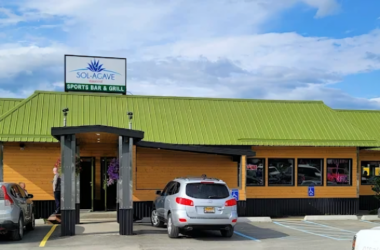The Kenai Peninsula Borough Assembly has voted 8-1 to pour an additional $4.7 million into next year’s school budget, fully “funding to the cap” after a lengthy debate that laid bare stark divisions over long-term fiscal strategy and local control.
Tuesday night’s amendment raises the borough’s FY 2026 contribution to the Kenai Peninsula Borough School District from $57.6 million to $62.3 million. Sponsor Brent Johnson told colleagues, “Funding to the cap is a crucial part of having success. Even if cap funding is still inadequate, would you rather have inadequate funding or less-than-inadequate?”
Johnson’s proposal drew pushback from Ryan Tunseth, who said he would rather stick with Mayor Peter Micciche’s original figure. “The public sees it as asking us to fund the cap so these things get done, but the reality is we have zero control over how the money is spent,” Tunseth said. “If I vote to fund the cap, will they still close Sterling [Elementary]? No one can give a straight answer.”
Tyson Cox, however, argued that failing to act now would accelerate an exodus of teachers in the wake of Governor Mike Dunleavy’s veto of a $680 base-student-allocation increase. “If you think the scores are bad now, wait until those kids aren’t at the school,” Cox said. “We’re creating our own mess by saying we’re not going to fund this.”
Assembly member Willie Dunne framed the vote as a matter of public trust. “Testimony has been overwhelmingly in favor of increasing the funding beyond the original proposal,” he said. “At least this year, through the Johnson amendment, we can show support for teachers, students, and our communities.”
The meeting’s flash point came when Johnson tried to add a separate, last-minute ordinance to retroactively add $1.94 million to the current-year school budget—money the district said would flow into its savings account. Borough Attorney Sean Kelley warned the maneuver violated the 13-day public-notice requirement. The retro-funding bid failed 5-4.
On KSRM’s SoundOff program Wednesday morning, Mayor Peter Micciche blasted the attempted add-on. “They attempted to sneak in nearly $2 million more for last year without public notice,” he said. “I called it a cheap shot, which they didn’t like.” In a press release later that day, Micciche criticized the maneuver further, noting that the school district hadn’t requested the money and that it was unlikely such a late-year appropriation could be legally enacted. “There would have been no time for anyone to weigh in on this nearly $2 million decision,” he said.
While acknowledging the Assembly kept his seven mill-rate reductions—cuts he said will leave “most taxpayers writing a smaller property-tax check this year”—Micciche warned that the new school allocation pushes education’s share of property-tax revenue from 38 percent to 44 percent. “Sales tax here is an education tax,” the mayor said on the air. “If we keep this pace we double property taxes in ten years.” He reiterated in his press release that “funding to the cap is the very mathematical definition of unsustainable,” pointing out that education already receives 100% of borough sales taxes.
Micciche also pointed to the district’s savings. “According to our calculations, they have $11.1 million in fund balance right now. Now they’ll have close to sixteen,” he said, adding that enrollment has fallen by 3,500 students over the past decade. “Doing this every year is financially unsustainable.”
He praised the original budget—passed 8-1 without amendment—for including a 2.5% annual inflationary increase while still coming in $428,000 lower than the previous year. “That’s a difficult feat during these high-inflationary times,” he said, “and it’s demoralizing for our employees who worked hard to get our costs down to make the KPB more affordable for families.”
Even Johnson conceded the issue will return. “We’ll be back next year,” he said during deliberations, “but tonight we control funding, and teachers and kids need an answer now.”
The amended FY 2026 budget—education now accounts for just over 53 percent of general-fund spending—faces a final procedural vote June 30. Micciche said he plans to assemble a task force to explore longer-term fixes, including carving out separate service areas for costly pools and auditoriums.
“Good schools are part of our quality of life,” the mayor said on the radio. “But without a statewide plan, we’re patching holes with local taxes and hoping the roof holds.”
In the press release, he expanded on that sentiment: “There should be two parallel processes at work—funding the business of education and improving academic outcomes with incentives for responsible management. The state needs to meet its constitutional requirement to fund education, and the district must bring its spending in line with sustainable growth.”






